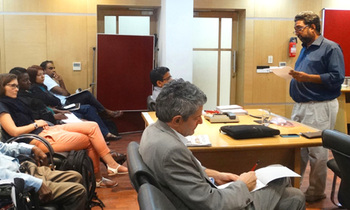GIZ hosts talk on Indian law governing health care providers
On 9 June, the Indo-German Social Security Programme (IGSSP) hosted a seminar in New Delhi entitled ‘India’s Clinical Establishment Act, 2010: Overview, Status & Implications for Health Insurance’. Sunil Nandraj, advisor to India’s Ministry of Health & Family Welfare on Regulation for the Clinical Establishment Act, 2010, delivered the keynote address at the seminar.
In India, nearly 80 percent of health care is provided by the private sector. Unlike most other business establishments that need a licence to operate, medical establishments were earlier not mandated to register or acquire a licence. This resulted in unchecked mushrooming of establishments with widely fluctuating standards of health care and a variety of unethical practices such as overbilling, unnecessary surgeries and tests, referrals for commissions, over prescription and so on.
The Clinical Establishments (Registration and Regulation) Act, 2010 was enacted by the Government of India to provide for registration and regulation of all clinical establishments in the country with a view to prescribing the minimum standards of facilities and services provided by them. The Act has taken effect in the four states of Arunachal Pradesh, Himachal Pradesh, Mizoram and Sikkim, and all Union Territories since 1st March, 2012. Uttar Pradesh, Rajasthan, Bihar and Jharkhand have adopted the Act and are under the process of implementing it.
At the Social Security Seminar, Sunil Nandraj outlined the process of enacting this landmark legislation, where the states need to be taken on board as legislation on health falls under their purview, and in the face of opposition from some sections of the medical fraternity. He underlined the need for such a regulation, also since many government-run health insurance schemes such as the Rashtriya Swasthya Bima Yojana (RSBY) operate on a Public-Private-Partnership mode, without full information on the way the health sector functions.
For poor and marginalised communities, unplanned medical expenses are a factor that drags them further into poverty. The burden of disease is compounded by malpractices, unnecessary expenditure on procedures and medicines or further treatments necessitated due to negligence or misdiagnosis. Hence registration of clinical establishments and better regulation with minimum quality standards would highly contribute to better medical treatment of the poor.
Nandraj explained that though the process of adopting the Act by the states is slow, it has generated awareness on the issue of standards in health care, put pressure on states to legislate and in effect, sown the seeds for long-term changes in the way private health care establishments function. The Act also enables creation of a comprehensive database of clinical establishments across the country, which is available in the public domain and can be a vital support in public health interventions during episodes of disease outbreak or disaster management.
The talk was followed by a question-answer session. Apart from attendance by Indian stakeholders in the health sector, the seminar was also attended by two visitors from the Social Security Commission of Namibia. The points raised included incorporating a grievance redressal mechanism into the Act, the reasons for the medical fraternity being averse to the legislation even though it could be used to differentiate qualified practitioners from frauds, mechanisms for ensuring compliance, and concerns raised regarding the increasing costs that this Act would entail to the establishments.

Background
The Indo-German Social Security Programme is part of Germany’s international cooperation with India. The programme advises and provides technical support to responsible ministries in the Government of India and state governments to design and implement social security programmes in line with India’s Unorganised Workers’ Social Security Act (UWSSA). It is managed by Deutsche Gesellschaft für Internationale Zusammenarbeit (GIZ) GmbH, an enterprise owned by the German Government. GIZ implements sustainable development through international cooperation, on behalf of Germany and other partners.